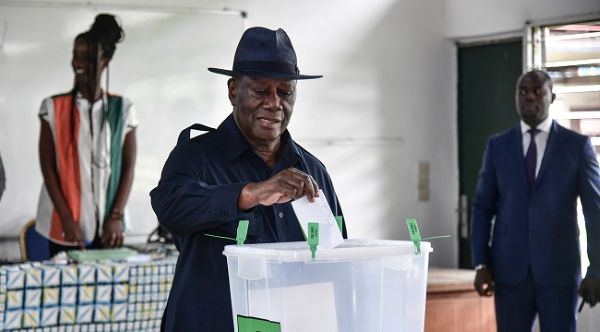Ivorians headed to the polls on Saturday in a presidential election dominated by 83-year-old incumbent Alassane Ouattara, the overwhelming favourite seeking a fourth term in office.
Ouattara has led the world’s top cocoa producer since 2011, overseeing years of economic growth as the nation reasserted itself as a West African powerhouse. Nearly nine million voters are eligible to choose among five contenders, though Ouattara’s path appears largely unobstructed after key opposition figures were barred.
Former president Laurent Gbagbo was disqualified over a criminal conviction, while ex–Credit Suisse CEO Tidjane Thiam was excluded for holding French nationality.
Turnout will be key in a poll shadowed by protests and sporadic unrest that left four people dead in recent weeks. Authorities have banned demonstrations, imposed curfews in some areas, and deployed 44,000 security personnel nationwide.
“The life of a nation depends on voting — it’s the only motivation for me,” said bus driver Ibrahim Diakite, casting his ballot in a pro-Ouattara suburb of Abidjan.
Despite tensions, some voters expressed calm. “We are voting today in peace. Our hope is for the day to pass without incident,” said Severine Kouakou in Bouaké, the country’s second-largest city.
Analysts say the absence of heavyweight challengers makes an upset unlikely. “It is hard to imagine any surprise at the end of this election since opposition heavyweights aren’t present,” said Gilles Yabi of the Wathi think tank.
The government has justified its tough stance as necessary to avoid a repeat of the 2020 election unrest that killed 85 people. “We must be ready to protect Ivory Coast,” Ouattara told supporters at his final rally.
Meanwhile, Gbagbo denounced the vote as a “civilian coup d’état” and “electoral robbery,” urging Ivorians to reject the process.
Among the remaining candidates are former trade minister Jean-Louis Billon, former first lady Simone Gbagbo, engineer Ahoua Don Mello, and centrist Henriette Lagou — none commanding the reach of Ouattara’s ruling RHDP party.
Observers from civil society, ECOWAS, and the African Union are monitoring the polls, with results expected early next week.
AFP


